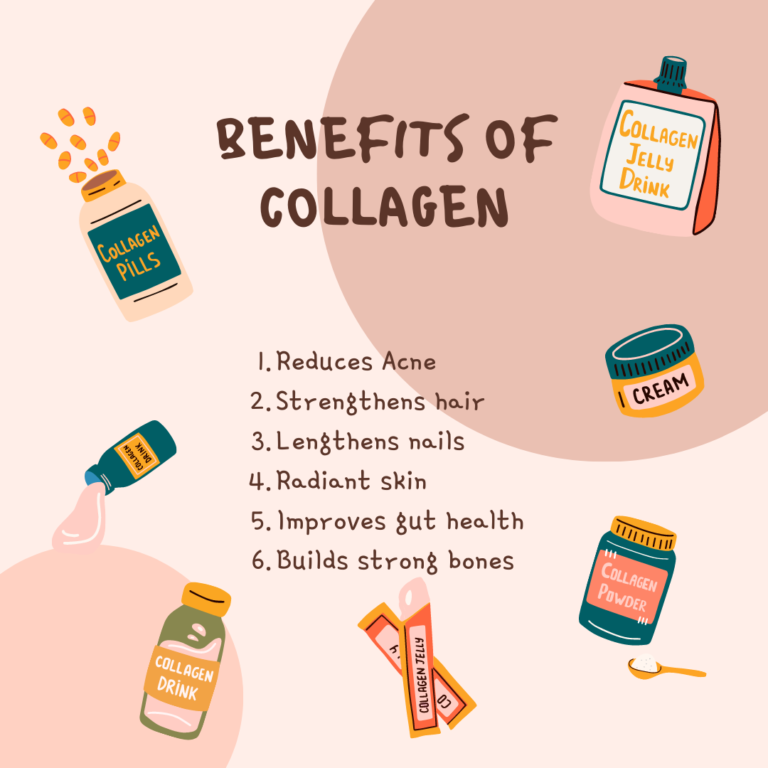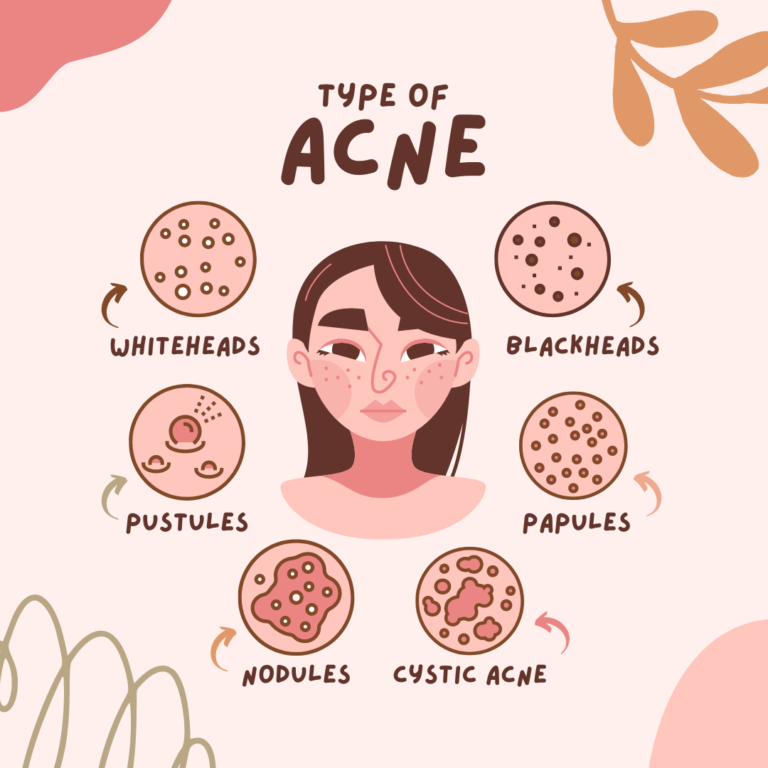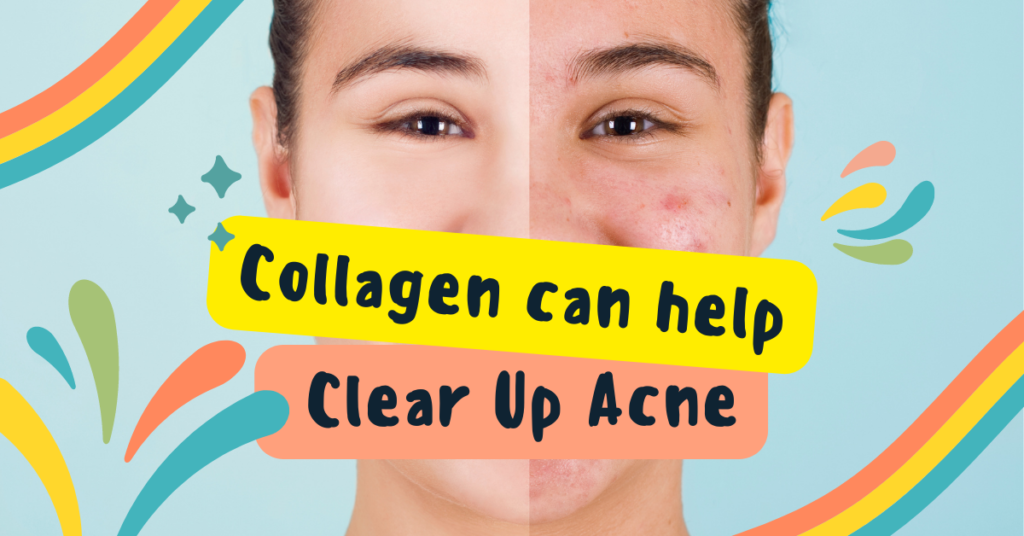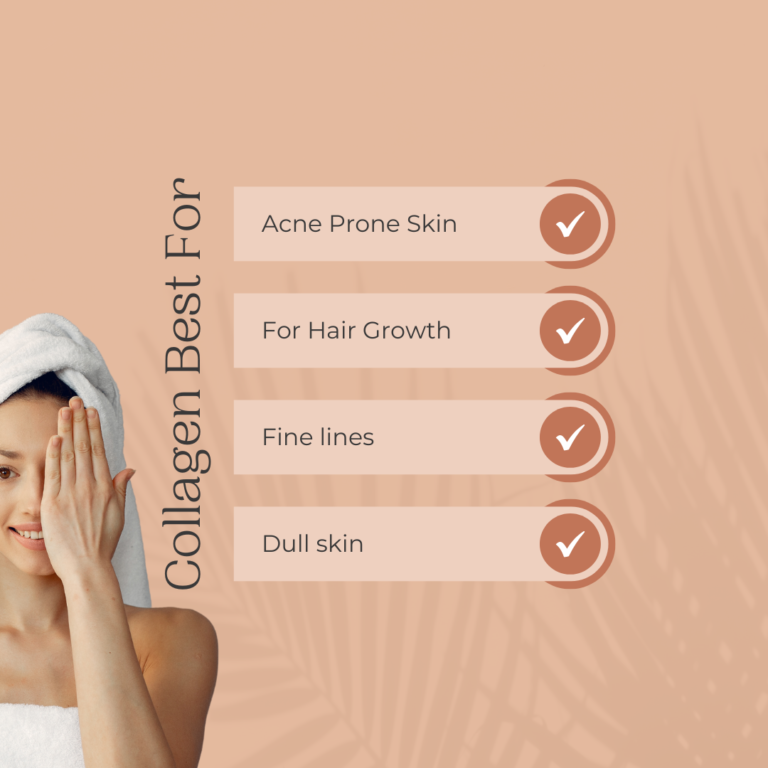Does Collagen Help with Acne? Acne is a skin condition that can affect people of all ages, genders and skin types. The causes of acne are varied and there has been much debate as to how best to treat it.
One possible solution offered by some is the use of collagen for acne treatment. This article will explore whether or not collagen can be an effective form of treatment for acne sufferers.
Collagen is a protein found in the body that helps to maintain the structure and strength of our skin and organs. As we age, our bodies produce less collagen – resulting in wrinkles and sagging skin. This decrease in collagen production has also been linked to other health issues such as joint pain, digestive problems, and cardiovascular disease.
Could introducing more collagen into our bodies help reduce the severity of acne? In this article, we’ll look at the evidence surrounding this claim and discuss if using collagen really is an effective form of acne treatment.

Table of Contents
ToggleWhat Is Collagen And How Does It Work In The Body?
- Collagen is the most abundant protein found in the human body, and it plays an essential role in keeping skin healthy.
- Collagen production naturally decreases with age, but it can be supplemented through diet or collagen powder.
- When collagen levels are high, skin conditions such as acne may improve due to increased elasticity and hydration.
- Collagen helps form a barrier between the inside of our bodies and the elements outside.
- It also aids in cell regeneration, which is essential for healthy skin.
Hyaluronic acid, another necessary component for healthy skin, binds to collagen molecules and helps keep skin hydrated.
By supplementing with collagen powder or increasing dietary intake of foods containing collagen (such as bone broth), we can increase our body’s ability to produce more of this beneficial protein.
This can help improve overall skin health and reduce symptoms of various skin conditions such as acne by promoting better hydration and increasing elasticity.
By taking steps to ensure adequate levels of collagen in our bodies, we can help maintain the health of our skin and reduce the effects of various skin conditions like acne.
Understanding The Causes And Types Of Acne

Acne is a complex skin condition that affects many individuals, and can range from mild to severe. Acne is caused by a combination of factors including the production of sebum (an oily substance produced by the body), hormones, bacteria, and free radicals.
Understanding the causes and types of acne can help people find the right treatment for their skin condition.
- Hormonal acne is one type of acne that can be caused by an increase in hormones like testosterone or estrogen. This type of acne may be cyclical and sometimes shows up during menstrual cycles or times of stress.
- Cystic acne is another type of acne which appears as painful bumps deep under the surface of the skin. These large lesions often cause significant scarring if left untreated.
When it comes to treating these two types of acne, there are several options available ranging from over-the-counter products to prescribed medications or natural remedies such as tea tree oil or green tea extract. It’s important to understand your own individual needs when selecting an acne treatment that will work for you.
In addition, reducing stress levels and maintaining healthy eating habits may also help reduce breakouts associated with hormonal changes or other triggers such as lack of sleep or poor hygiene habits.
No matter what type of acne you have, understanding its causes and finding the right treatment plan can help keep your skin clear and healthy in the long run. Taking proactive steps such as researching potential treatments and speaking with a dermatologist can help ensure you get on track to improved skin health.
The Relationship Between Collagen And Skin Health
Acne is a common skin condition that causes inflammation, redness, and breakouts. Now, understanding the causes and types of acne gives us an opportunity to explore the relationship between collagen and skin health.
Collagen supplements are becoming increasingly popular for its many potential benefits, including relieving joint pain, fading acne scarring, hydrating skin, and more.
While there is no definitive answer on whether collagen helps with acne specifically, incorporating collagen into your daily routine may still offer some benefit to your skin health.
Collagen supplements come in various forms such as marine collagen peptides or powder form which are easily added to smoothies or other food items.
Additionally, taking vitamin C with collagen can help increase its absorption rate and make it more effective.
The benefits of collagen include enhanced skin hydration, improved elasticity of the skin, and reduced wrinkles. While these effects are great for improving overall skin health and appearance, they don’t directly affect acne itself.
However, it may still be beneficial for those who suffer from cystic acne or other severe forms of pimples as the anti-inflammatory properties of collagen could potentially reduce the size of pores and lessen inflammation associated with breakouts.
It’s important to note that while there are numerous potential benefits related to using collagen supplements, much more research needs to be done in order to confirm its effectiveness when it comes to treating specific conditions like acne. In any case, taking steps towards maintaining healthy skin is always wise even if there isn’t a direct correlation between collagen and acne resolution.
Does Collagen Supplementation Improve Skin Quality?
Collagen is a protein found in the body that helps to strengthen connective tissue and provide structure and elasticity to skin. As people age, their collagen levels naturally decline, resulting in wrinkles, fine lines, and other signs of aging.
Some people believe that taking collagen supplements or applying topical treatments containing collagen can help improve skin quality and treat acne. In regards to treating acne specifically, there is limited evidence to support the use of collagen supplementation. However, some studies suggest that using liquid collagen combined with salicylic acid may be beneficial for improving skin health.
Here are some potential benefits of using collagen supplementation:
- It may help improve skin elasticity
- It may reduce wrinkles and fine lines
- It could potentially treat acne breakouts
- It could potentially reduce inflammation on the skin
Collagen comes in different types, including marine collagen from fish scales and bovine collagen from cows. Marine collagen has been linked to improved elasticity in skin cells and reduction of wrinkles, while bovine collagen has been linked to improvements in overall hydration and moisture content of the skin.
Ultimately, more research is needed to determine whether or not collagen supplementation can effectively improve skin quality or help treat acne breakouts. Overall, it appears that there are potential benefits associated with taking certain types of liquid collagen supplements combined with topical treatments such as salicylic acid. Still, further research is necessary to fully understand how effective these treatments can be for improving skin health or treating acne breakouts.
The Potential Benefits Of Collagen For Acne-Prone Skin
Having discussed the potential benefits of collagen supplementation to improve skin quality, let us now turn to how collagen may be beneficial for acne-prone skin.
Acne is a complex disorder that can be caused by a variety of factors, including hormonal changes, stress and the use of certain skincare products. While there is no evidence that suggests that collagen itself can cause acne, it may help to reduce the appearance of scars left behind from previous breakouts.
In addition to helping with scarring, collagen may also have other beneficial effects on acne-prone skin. Collagen-rich foods such as fish and eggs can provide essential nutrients for healthy skin. It has been suggested that consuming these foods may help to boost collagen production in the body, which could reduce inflammation and keep skin looking smooth and hydrated.
Additionally, certain laser treatments used to treat acne are thought to stimulate collagen production in the area around the blemish, thus reducing the appearance of scars.
Finally, adding a few drops of pure collagen into your daily skincare routine could help you achieve a clearer complexion. Collagen can act as an emollient and humectant to lock in moisture while providing an antioxidant boost for healthier looking skin. It is important to note however that while topical applications of collagen may provide temporary relief from symptoms associated with acne, they should not replace proper medical treatment or lifestyle changes recommended by your doctor or dermatologist.
Therefore, it appears that incorporating more collagen into your diet or skincare routine could be beneficial for those suffering from acne or acne scarring. Taking small steps towards improving your overall health and wellbeing may have positive implications for the condition of your skin over time.
Scientific Evidence Supporting The Use Of Collagen For Acne
Acne is a common skin condition that can have serious implications for an individual’s physical and mental wellbeing. While conventional treatments such as topical creams and antibiotics can help to reduce inflammation, recent research has demonstrated the potential benefits of collagen supplementation for acne sufferers.
Collagen is a naturally occurring protein in the body which plays a key role in immune system functioning, wound healing, and collagen synthesis. It is thought that by supplementing with collagen, it can help improve the skin health of those suffering from acne by reducing inflammation and providing other essential nutrients.
Collagen supplements are often used as part of an overall skincare regime; they not only provide essential nutrients to the body but also act as effective anti-inflammatories. As well as helping to heal existing blemishes, collagen supplements may also aid in preventing new breakouts from forming. Additionally, since collagen is a natural protein it carries fewer risks than some synthetic chemicals found in skincare products which may cause allergic reactions or irritate sensitive skin types.
The evidence for the use of collagen supplementation for acne sufferers is growing; studies have shown that taking daily doses of collagen can improve skin texture and reduce inflammation associated with acne breakouts. Furthermore, this form of treatment has been found to be more effective than traditional treatments such as antibiotics or topical creams when taken over an extended period of time.
Collagen provides many potential benefits for those seeking relief from their acne symptoms. Its ability to reduce inflammation and heal wounds makes it an ideal supplement for those looking to improve their skin health without resorting to drastic measures or potentially hazardous skincare products. The evidence suggests that by supplementing with collagen on a regular basis, individuals suffering from acne may experience relief from their symptoms while also improving their overall complexion.
How To Incorporate Collagen Into Your Skincare Routine
Collagen is a powerful aid in managing acne, but it doesn’t just start and end there. It can be incorporated into your existing skincare routine to maximize its potential for healing.
Collagen works to reduce inflammation and speed up the healing process, while also helping to regulate oil production and hydrate dry skin. The best way to capitalize on this is by incorporating a marine collagen supplement into your daily skincare routine.
Taking a marine collagen supplement each day can help promote healthy skin from within, providing the nutrients necessary for collagen production and boosting the overall health of your skin. In addition, you can use topical products that contain collagen or other natural ingredients such as aloe vera, which have been shown to have anti-inflammatory properties. These topical treatments will help soothe any irritation caused by acne and provide extra hydration to the skin.
It’s important to remember that when using collagen for acne management, consistency is key. You won’t see results overnight; it may take several weeks before you notice any changes in your skin’s appearance or overall health. As long as you stick with it and follow a consistent regimen of both internal and external treatments, you should begin to see a difference over time.
By taking marine collagen supplements daily and using topical products containing natural ingredients like aloe vera, you can help support the healing process of your skin while reducing inflammation due to acne breakouts. With dedicated use over time, these steps will help improve the overall health of your skin – leaving it looking brighter and clearer than ever before!
Are There Any Potential Side Effects Of Taking Collagen Supplements For Acne?
We all know how frustrating acne can be to deal with, and many of us have heard that collagen could potentially help. But what about the potential side effects of taking collagen supplements for acne? As it turns out, there are a few things to consider before adding collagen to your skincare routine.
Collagen is an essential amino acid found in certain foods like fish, poultry, and beef. It’s also available in powder form as a dietary supplement. Most of these powders contain pure collagen, but other ingredients like tea tree oil may also be used.
While some studies have shown that taking collagen supplements may reduce the appearance of wrinkles and improve skin elasticity, there’s limited evidence that it can help with acne. That said, there are some potential side effects associated with taking collagen supplements for acne.
For instance, if you’re allergic to any of the ingredients used in these supplements—such as wheat or egg-based products—you may experience an allergic reaction after taking them. Additionally, some people have reported experiencing digestive upset or nausea when using these products.
It’s important to consult your doctor before starting any new supplement regimen for your skin care needs. They can provide advice about which product might work best for you and discuss any potential risks associated with taking it. Ultimately, if you decide to give collagen a try for your acne, make sure to follow the instructions on the label carefully and report any adverse reactions you experience right away.
Other Natural Remedies For Acne-Prone Skin
Moving on from the potential side effects of taking collagen supplements for acne, other natural remedies for acne-prone skin can also be beneficial.
One key factor in managing and reducing breakouts is to ensure that dead skin cells are regularly removed from the surface of the skin. This can be done through a regular daily routine including cleansing, exfoliating, and moisturizing.
In addition to this, gut health should also be taken into consideration as healthy bacteria in the gut keep hormones balanced which can help reduce breakouts.
- A balanced diet with vital proteins is important for overall skin health. Eating plenty of fruits and vegetables, foods rich in omega-3 fatty acids like salmon, and reducing sugar intake are all good practices to manage acne-prone skin.
- Additionally, topical treatments such as glycolic acid or chemical peels can also help reduce inflammation and blemishes associated with acne.
It’s important to remember that everyone’s body is different and what works for one person may not work for another when it comes to managing breakouts.
It’s always best to try multiple methods of management before deciding on a specific treatment plan.
Talk to your healthcare provider about any questions or concerns you may have about managing your acne-prone skin.
Overall, there are many natural remedies that can help reduce breakouts associated with acne-prone skin when incorporated into a regular skincare routine.
Taking steps such as maintaining gut health through diet and using topical treatments like glycolic acid can help improve overall complexion and reduce acne flare-ups over time.
Conclusion: Should You Try Collagen For Your Acne?
Collagen has been touted as a potential way to help with acne, but does it really work?
Acne is caused by several skin issues, and collagen may play an important role in its treatment. Collagen helps to improve blood flow and stimulate the sebaceous glands, both of which can have a positive effect on acne.
In order to get the most out of collagen when treating acne, it is important to use it in the following ways.
First, take supplements that contain collagen. This will provide your body with more of the protein needed to keep skin healthy and free of blemishes. Additionally, use topical treatments that contain collagen. These products can help reduce inflammation and improve the appearance of scars left behind by acne.
Finally, make sure you are getting enough Vitamin C in your diet. Vitamin C is essential for helping your body produce collagen naturally.
It is also important to note that while collagen may help with acne, it cannot cure it entirely on its own. You should always consult with a doctor before beginning any new treatment plan for your skin issues including acne. A doctor can advise you on the best course of action for treating your particular type of acne and how best to incorporate collagen into that plan if needed.
Overall, there is evidence that suggests using collagen as part of an overall anti-acne plan may be effective in some cases. However, it should not be viewed as a magic bullet solution for all types of acne or other skin issues; instead it should be used in conjunction with other treatments recommended by a health care professional for best results.
Frequently Asked Questions
What Is The Recommended Dosage Of Collagen For Acne Treatment?
Collagen is thought to be beneficial for treating acne, and the recommended dosage depends on the individual’s specific needs. Generally, doctors suggest taking 10-20 grams of collagen per day for best results.
This amount can be taken in either one dose or divided into several smaller doses throughout the day. It is also important to ensure that the collagen you buy is from a reputable source, as it may contain additives or ingredients that can irritate your skin.
In addition, it is important to consult with your doctor before starting any new supplement regimen, including taking collagen for acne treatment.
Are There Any Particular Brands Of Collagen Supplements That Are Better For Acne?
There are many brands of collagen supplements available to help with acne, but not all are created equally. It’s important to research the quality and ingredients of each supplement before making a decision. Reputable brands like Obagi, Neocell, Doctor’s Best, and Sports Research have been shown to be effective in treating acne-related issues.
Ultimately, it’s important to find the right product for you and your individual needs.
Are There Any Natural Sources Of Collagen That Can Be Used For Acne Treatment?
- Collagen is an important part of skin health, and it can be found in many natural sources.
- Many people are turning to these sources for acne treatment, as there are several that contain powerful anti-inflammatory and antioxidant properties.
Examples include bone broth, salmon and other fish, dark leafy greens like kale and spinach, and citrus fruits.
Each of these foods contains different types of collagen, so you may want to try a variety if you’re looking for a natural source of collagen to treat your acne.
Are There Any Other Lifestyle Changes I Can Make To Reduce Acne?
Making certain lifestyle changes can help reduce the appearance of acne.
- Eating a balanced diet with plenty of fruits and vegetables, drinking lots of water, and avoiding sugary snacks are all beneficial steps to take.
- Reducing stress levels is key since it can worsen acne breakouts.
- Exercise and relaxation activities like yoga or meditation can help keep stress levels down.
- Finally, be sure to cleanse your skin regularly and use an oil-free moisturizer as part of your daily skincare routine.
What Are The Long-Term Effects Of Taking Collagen Supplements For Acne?
Collagen supplements are thought to help reduce acne, but it’s important to understand the long-term effects of taking them.
Your body needs certain nutrients and vitamins to stay healthy, and collagen supplements can provide this if taken correctly. However, overuse or misuse of collagen supplements may lead to potential side effects like nausea, headaches, or joint pain.
Additionally, there is a lack of research around the long-term safety of taking collagen supplements regularly. Therefore, it’s important to speak with your doctor before beginning any regimen.
Conclusion : Does Collagen Help With Acne?
Taking collagen supplements for acne can be beneficial. I recommend consulting a dermatologist or healthcare provider to determine the best dosage for your needs.
Additionally, it is important to be mindful of other lifestyle changes that can help reduce your acne, such as eating a balanced diet and avoiding harsh skincare products.
In the long run, taking collagen supplements as part of an overall skin care regimen could reduce the appearance of blemishes and improve the skin’s overall health. It is important to note that results may vary from person to person, so it may take some time before you see any improvements.



